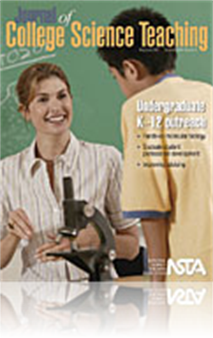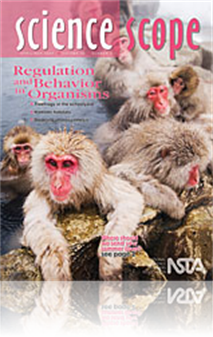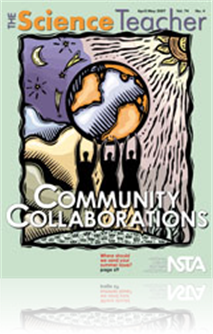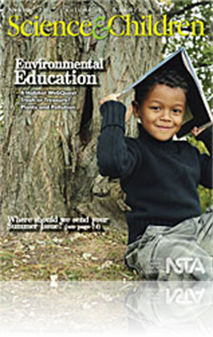All Resources
Journal Article
Meaningful Involvement of Science Undergraduates in K-12 Outreach
The authors argue for the involvement of science undergraduates in K–12 outreach to enhance their communication skills, generate enthusiasm for science in today’s youth, and extend relationships between institutions of higher learning and surroun...
Journal Article
Designing and Implementing a Hands-On, Inquiry-Based Molecular Biology Course
Inquiry-based learning was used to enhance an undergraduate molecular biology course at Georgia Southern University, a primarily undergraduate institution in rural southeast Georgia. The goal was to use a long-term, in-class project to accelerate hig...
Journal Article
From A Bird’s Eye View: An Interdisciplinary Approach to Migration
Inspiring students to learn about birds can be a daunting task—students see birds just about every day and often don’t think twice about them. The activity described here is designed to excite students to “become” birds. Students are asked to...
Journal Article
Accomplishing Multiple Goals Through Community Connections
With schools being asked to accomplish more and more, it is increasingly important to, whenever possible, address multiple goals in teaching. Educating the whole child dictates that we find ways to ensure our graduates are well-rounded, independent t...
Journal Article
The Invention Factory is a nontraditional youth-based, after-school program in Honolulu that teaches information technology and mechanics to teenagers through interactive, hands-on projects that improve human computer interaction for individuals with...
Journal Article
After the Bell: It’s all in the pattern—Recognizing symmetry in architecture
As teachers, we try to make subjects applicable to students’ lives. A topic that extends well beyond the classroom and any single discipline is the physical properties of symmetry found in architecture. Few curriculum programs, however, have implem...
Journal Article
Investigations with Wisconsin Fast Plants can make the subject matter come alive…or dead, depending on the experimental treatment. This became apparent when a university-based teacher educator and a fifth-grade teacher collaborated on a professiona...
Journal Article
Directed Student Inquiry: Modeling in Roborovsky Hamsters
In this inquiry-based activity, Roborovsky hamsters are used to provide students with an opportunity to develop their skills of analysis, inquiry, and design. These hamsters are easy to maintain, yet offer students a means to use conventional techniq...
Journal Article
The Early Years: Collards and Caterpillars
Community, assemblage, network, complex, interdependent, web, and synergism—definitions of an ecosystem often include these words to highlight the dynamic interrelated workings of plants and animals with their physical environment. Young children d...
Journal Article
Commentary: Community Collaborations
The National Science Education Standards offer the first assurance that community collaborations can be meaningful as they describe science instruction that educates students to “engage intelligently in public discourse and debate about matters of ...
Journal Article
Editor’s Roundtable: Life in balance
The connection between the functions and processes of an organism’s body system and its survival is a fundamental concept that all students need to understand. This issue of Science Scope presents a collection of activities that can help you teac...
Journal Article
Are There Really Treefrogs Living in the Schoolyard?
Every schoolyard presents a wealth of opportunities for science exploration. To capitalize on this resource, the authors developed an activity in which students assessed whether their schoolyard could provide a viable habitat for treefrogs. This inqu...
Journal Article
Science Sampler: More than just a day away from school—Planning a great science field trip
With all the things that middle school science teachers have to juggle during the year, designing a science field trip can seem like a daunting task. Fortunately, there are many strategies that teachers can use to help ensure that field trips are mor...
Journal Article
Editor’s Corner: Community Service Learning—Making Education Interesting and Relevant
It makes good sense that community service learning can engage students. For students at risk of dropping out, it may provide the vital connection with adults and peers—and the opportunity for interesting, authentic learning—that could make all t...
Journal Article
Science Shorts: Ecosystem in a Jar
Stories about global warming and habitat loss are common news these days. Additionally, there are numerous reports about the loss of diversity among living things across the globe. These ideas and concepts are abstract and convoluted even for most ...
Journal Article
A Quest is a treasure hunt-style poem in which the writers lead the visitor to special places on the property. The poems have movement clues to take the visitor from place to place and educational clues that teach about aspects of each property. The ...
Journal Article
Environmental Education Saves the Day
At the start of each school year at Oil City Elementary Magnet School in Oil City, Louisiana, eager students ask, “What’s our theme this year?” This curiosity comes from their expectations that they will study a different environmental concept ...
Journal Article
Scope on Safety: Chemical tracking systems—not your usual global positioning system!
The haphazard storing and tracking of chemicals in the laboratory is a serious safety issue facing science teachers. To get control of your chemicals, try implementing a chemical tracking system. A chemical tracking system (CTS) is a database of che...
Journal Article
Bridging the Gap Between Classrooms and Research Laboratories
In the ever-expanding realm of science, educators struggle to share new discoveries and techniques with their students. Keeping abreast of recent advances can be daunting, even for the most motivated teacher. Fortunately, the National Science Fou...
Journal Article
Building Leaves and an Understanding of Photosynthesis
Where does cellular respiration take place? How does a plant make food and in turn use the food to produce its own energy? Do animals carry on this process also? To help students answer these and other questions, have them build a model leaf, plant c...
Journal Article
Science Sampler: Radio-wave inquiry with web-controlled receivers
This article describes a web-enhanced investigation of radio waves suitable for upper middle school science students that correlates with the National Science Education Standards. In this engaging lesson, students are involved in science inquiry usi...
Journal Article
Issues in-depth: Are you what you eat? An inside look at high-tech food
If we abide by the familiar saying “you are what you eat,” it is understandable that people may be concerned with the incredible advances in food science technology and their possible impacts on human health. For example, in recent years high-tec...
Journal Article
Science Sampler: Beyond Yellowstone
In 2001, Yellowstone National Parks’ education staff launched Windows Into Wonderland (WIW), a series of six internet-based, electronic field trips, or “eTrips,” designed especially for middle school students. Today 17 programs are available, m...
Journal Article
Science Sampler: The experiment event
The annual Experiment Event is the culminating activity of an extensive study of questioning, problem solving, and the inquiry process. Easily addressing national and state standards for science inquiry, the Experiment Event is only part—perhaps th...
Journal Article
Science 101: How does photosynthesis work?
Energy transformations are an important part of the functioning of ecosystems, and a key part of those energy transformations is photosynthesis. Photosynthesis is the process by which plants, bacteria, and other organisms use the energy of sunlight t...






